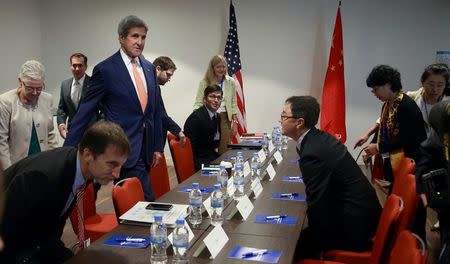Kerry - nations may agree different deadlines to cut HFC greenhouse gases
By Lesley Wroughton and Clement Uwiringiyimana KIGALI (Reuters) - Nations working to reduce greenhouse gases used in refrigerators and air conditioners may agree to set different deadlines, U.S. Secretary of State John Kerry said on Friday, raising hopes for a breakthrough against climate change. Kerry consulted with officials from China, India and Pakistan during a meeting in Rwanda that aims to strike a global accord among some 150 nations on ways to reduce the use of factory-made hydrofluorocarbon (HFC) gases. India wants to give developing nations more time to adapt their industries. The United States and about 100 other nations, including many developing countries, want faster action. If a deal can be clinched, it would crown a mounting wave of measures to help fight climate change this month. Last week, the 2015 Paris Agreement to curb climate-warming emissions passed its required threshold to enter into force after India, Canada and the European Parliament ratified it. "Everyone in this room is aware of how serious the stakes are," Kerry told delegates assembled for a plenary session. The United States has already begun phasing out HFCs, he said, but "other countries will start at a later time with a different baseline, and other countries perhaps even different from that." Kerry is due to fly out of the Rwandan capital Kigali later on Friday, when talks had been scheduled to end. But officials said negotiations would likely run into Saturday. CONFIDENT OF AN AGREEMENT "I am confident that, at the end of the conference, we are going to see an agreement," U.N. Environment Programme head Erik Solheim told Reuters. Solheim called on all sides to show flexibility and said talks were approaching "a middle ground." A quick reduction of HFCs could be a major contribution to slowing climate change, avoiding perhaps 0.5 degrees Celsius (0.9 Fahrenheit) of a projected rise in average temperatures by 2100, scientists say. India, the world's third-largest emitter of greenhouse gases, is under pressure to speed up its plans for cutting HFCs. New Delhi had previously been pushing for a 2031 deadline, but on Thursday said the peak could be set for between 2024 and 2026. The United States, European Union and African states are among those seeking a peak sooner, around 2020 to 2022. "If we’re going to give this amendment the teeth it needs to prevent as much as a half-degree of warming, then we need to make sure we’re pushing for the most far-reaching amendment we can adopt," said Kerry, who also discussed climate change in a meeting with Rwandan President Paul Kagame earlier in the day. A senior State Department official said later the talks were in the final stretch "with a fair number of issues still outstanding." STAGGERED IMPLEMENTATION The official said an agreement could include staggered implementation by developing nations that want more time to reduce HFC gases, others that have more ambitious targets, and donor nations like the United States that have already begun cutting HFCs. "I can't say for sure how this architecture will land but it might end up with three groups," the official said. Environmental groups have called for an ambitious agreement on cutting HFCs to limit the damage from the roughly 1.6 billion new air conditioning units expected to come on stream by 2050, reflecting increased demand from a rapidly expanding middle class in Asia, Latin America and Africa. An HFC accord would complement the Paris Agreement on limiting global temperatures rises, which was clinched in December and came into force this month, and a deal to limit emissions from aviation sealed in October. Use of HFCs, which can be 10,000 times more powerful than carbon dioxide as greenhouse gases, is already declining in many rich nations. The HFC talks follow up from the 1987 Montreal Protocol, which succeeded in phasing out the use of chlorofluorocarbons (CFCs), widely used at that time in refrigeration and aerosols. The aim was to stop the depletion of the ozone layer, which shields the planet from ultraviolet rays that can cause skin cancer. An amendment to the Montreal Protocol covering HFCs is to be agreed by consensus. (Editing by Katharine Houreld and Tom Heneghan)

 Yahoo News
Yahoo News 

